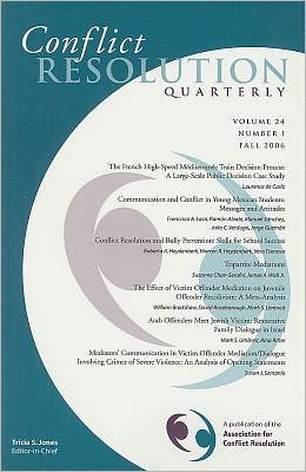Conflict Resolution Quarterly special issue, summer 2003

Conflict Resolution Quarterly devoted its Summer, 2003 issue to articles resulting from a 2002 symposium Broad Field organized jointly with the University of New Mexico Law School. The symposium and this special issue pioneered themes later developed on a worldwide level in the Rethinking Negotiation Teaching Project.
Christopher Honeyman, Scott Hughes and Andrea Schneider served as guest editors, and the editor's note described the issue in these terms:
COLLOQUY: REFLECTING ON LEARNING MODELS IN THE FIELD.
How Can We Teach So It Takes? (Christopher Honeyman, Scott H.Hughes, Andrea K. Schneider)
This introductory article explains the genesis of the conference from which the colloquy articles were drawn. It overviews the articles and articulates the next directions for several of these projects.
Adversaries? Partners? How About Counterparts? On Metaphors in the Practice and Teaching of Negotiation and Dispute Resolution (Jonathan R. Cohen)
Metaphors are a powerful linguistic and conceptual tool, much more powerful than conflict managers often acknowledge. This article suggests that dominant metaphors in the field should be reviewed and that innovative metaphors that better capture the complexity of conflict be introduced in the teaching and practice of dispute resolution.
Conflict Resolution: If It Weren't for the Client, I'd Have Done a Great Job (Sanda Kaufman, Bobbi McAdoo).
Most of the teaching and training models in the field are focused on third-party neutrals, not third parties acting as agents within a dispute. Although some of the training for neutrals can be useful to educating agents, it is not fully sufficient. This article discusses the training needs for three specific kinds of agent: lawyers, urban planners, and architects.
Having Students Take Responsibility for the Process of Learning (Andrea K. Schneider, Julie Macfarlane)
Wouldn't it be valuable if we structured our dispute resolution courses with the same principles and processes that we attempt to teach in those courses? These authors think so and suggest a variety of techniques and pedagogical processes that enact these changes.
Windows on Diversity: Lawyers, Culture, and Mediation Practice (Michelle LeBaron, Zena D.Zumeta)
Mediators need to develop and sustain cultural competency. Initial development of this sensitivity may come when mediators become much more reflective about their own professional cultures and identities.
Training on Purpose (Robert R. Stains Jr.)
What is our motivation for learning? This author suggests that we should be more attentive to the purposes that motivate the people we train because that motivation is key to true learning and focused application.
Learning About Learning: The Value of "Insight" (Cheryl A. Picard)
Insight mediation, and similar dispute processes, are informed by the philosophy of learning proposed by Bernard Lonergan. Lonergan's model of learning and its application to mediation training and mediation process are thoroughly discussed.
Complexity, Conflict Resolution, and How the Mind Works (Wendell Jones, Scott H. Hughes)
Revolutions in thinking are challenging long-held assumptions in Western epistemology. They call into question many of the assumptions we make about what we know and how we know it in our professional practice.
Is It "Peacemakers Teaching?" or Is It "Teaching Peacemakers?" (Philmer Bluehouse)
This article offers a powerful personal reflection from a peacemaker who has learned much from those he "helps" as peacemakers.